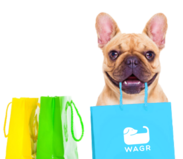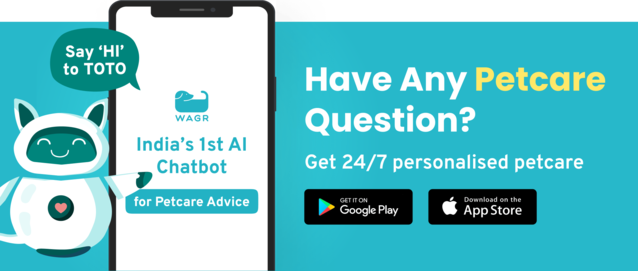As pet parents, we only want to provide our little companions with the best, be it food, toys, or grooming. But here's a more important question: do you know what is best for your pet?
The number of pet parents who feed home-cooked food to their pets has been increasing significantly since the COVID-19 lockdown due to the country-wide pet food shortage back in 2020. Over time, Indian pet parents are seeing home-cooked as a better, safer alternative.
But is it really? What do you need to consider while switching to it? This post will draw a comparison between branded and homemade food for your pet to help you make the right choice.

Branded Dog food: Is it the best choice for your pet?
It goes without saying that branded dog food is the most convenient choice for your pet. It comes in different varieties (dry, wet, semi-wet, treats, and so on), is easy to store and serve, has a longer shelf life, and requires very little preparation on your part. Lastly, but most importantly, every pet food is designed using a formula that ensures that your pet's nutritional requirements are met.
Your pet's nutritional requirements are determined by factors like their age, weight, and breed, which most recognized pet food brands ensure they meet through their wide range of foods.
That being said, there are two issues with branded dog foods that most pet parents face today. The first issue is of availability: a challenge that Indian pet parents faced during the onset of COVID-19. And while we’ve overcome this crisis now, those who have switched to homemade dog food are reluctant to resume buying branded dog foods.
The second issue is of the safety of branded dog foods, which has become a global concern for pet parents. In 2011, a paper published in the British Journal of Nutrition pointed to chemical contaminants as one of the reasons for increasing worry over commercial pet food. In 2007, the Food and Drug Administration (FDA) in the US recalled large amounts of pet food which was seen to be causing health issues in pets. A growing mistrust over the years has also made many pet parents turn to home-cooked meals for their furred friends.
But is the switch from branded dog food to homemade dog food really a good idea? Let's find out.
Homemade dog food: Can it work as an alternative?
For those who have trouble trusting the quality of branded dog foods, homemade dog food is a great alternative as it offers you control over quality, safety, and budget. Another important benefit is that your beloved pets get to eat freshly prepared food, which is both healthy and appetizing.
Furthermore, cooking your pet's food at home also opens up the opportunity of adding variety to their diet. You needn't fill in the same kibbles into their food bowl every day. Instead, you can feed them different kinds of vegetables (carrots, beans, sweet potatoes, and so on) and meat (ground beef, chicken, fish) with rice. Homemade food is especially helpful if your canine friend happens to be a picky eater and seems unhappy with their food no matter how many brands you try.
To the pet parents who wonder if homemade dog food can work as an alternative to branded dog foods, the answer is yes, absolutely. However, it's not going to be easy. If you're planning to switch to homemade food for your pet, you'll need to keep certain things in mind.
Switching to homemade food for your pet? Here's what you must know
The first thing that you need in abundance to cook your pet's meals is time. Many pet parents seem to think that sharing their own meals with their canine friends is an effective solution, but they couldn't be farther from the truth.
The nutritional requirements of your pet are completely different from yours, and sharing your meal can make them vulnerable to a large number of health issues, including poisoning.
You will need to cook separately for your furry friends to keep them healthy, which is a time-consuming process.
Getting expert advice from day one
Unless you're a veterinary nutritionist or happen to have one in your home, it's always best to consult your vet who knows your pet’s health history before you make the switch.
Alternatively, here on wagr's site you can also book an appointment for online vet consultation and get a expert advice from verified nutritionists and veterinarians in the country. Whichever you pick, make sure that you learn about your furred friend's dietary needs in-depth before you start cooking food for them.
Learn about the fatalities first
Dogs cannot eat a lot of the items that we can, and sometimes pet parents are unaware of it. To help you out, we list some of the items that are lethal to dogs:
Citrus fruits
Grapes and raisins
Avocado
Milk and other dairy products
Coffee
Chocolate
Nuts
Salt
Onion, chives, and garlic
Raw eggs
Any processed food that's manufactured solely for human consumption
Looking up recipes online? Don't make this mistake
There are millions of videos and recipe guides for dogs online, but not all of them may be verified by experts.
Before you follow an online dog food recipe, do a thorough background check on the qualification of the person who has made it and the sources they have used for the process.
Tip: When you do find a trusted online source, make sure you follow the recipe carefully, making no addition or omission of your own. Doing this can potentially have an adverse effect on your pet.
Adding supplements to make their diet more wholesome
Most pet parents consider homemade dog food to avoid the additives in branded dog foods, but not all of them are harmful. These foods also contain healthy ingredients like Omega 3,6, and 9 fatty acids, supplements for Vitamins A and D3, and amino acid chelates, which ensures your pet gets a more wholesome and nutritionally-balanced diet.
Home-cooked meals commonly miss out on some of these important nutrients, which calls for supplements. Again, you'll need to discuss it with your veterinarian or pet nutritionist first; we'd strongly suggest you not to buy any supplements without proper consultation.
Keep an eye on your pet's response to the switch
Transition is never easy, be it for you or your pet. This is why it's important that in the initial weeks of the switch, you need to keep a close eye on your pet for any unusual signs, behaviors, or symptoms, such as sudden stomach ache, lack of appetite, vomiting, diarrhea, and so on. If you notice anything unusual, do consult your vet.
To wrap it up, both homemade and branded dog foods come with their own pros and cons. However, dog nutrition is tricky. If you choose to cook for your pet, you need to be extra watchful and always aligned with your vet’s advice.











